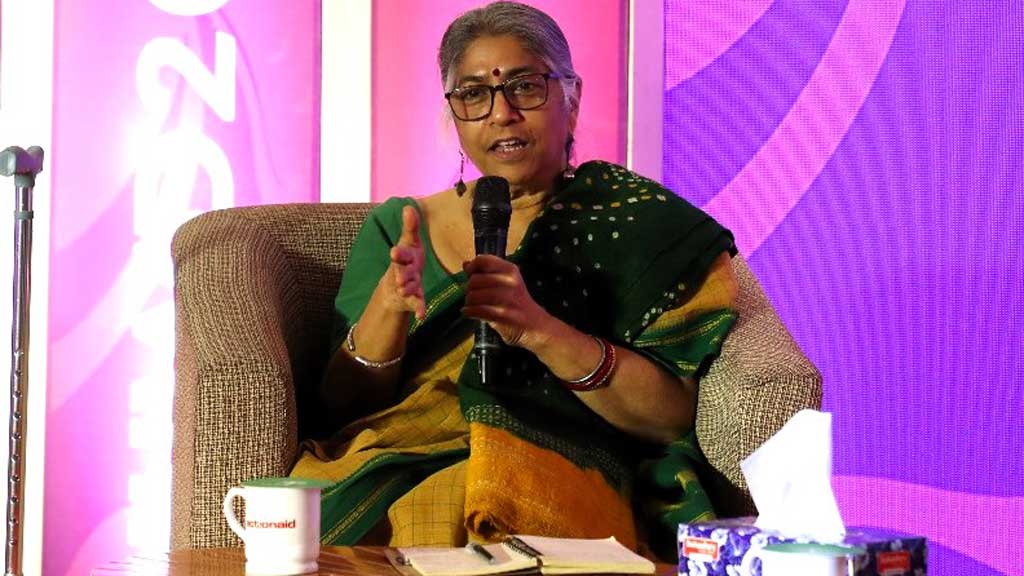Home
+

Published : 09 Mar 2025, 03:25 AM
The Women’s Affairs Reform Commission is preparing to release its report this month, having met with women from different professions both in Dhaka and elsewhere in Bangladesh to gather their views.
The commission’s chief Shireen Parveen Haque says the recommendations are based on these discussions and the commission members' observations.
Speaking to bdnews24.com, she explained that the commission aims to identify areas where gender discrimination persists and propose solutions to tackle these issues.
Shireen said, "Whether it is in the law, the constitution, policies, or employment, we have mapped out where discrimination exists. The proposals will focus on eliminating these disparities.
“It will be a step towards ending discrimination and promoting equality."
She, however, feared that many of the commission's suggestions may face several obstacles.
The commission chief said the reason is that Bangladeshi society remains conservative toward women, with misogyny also being a factor.
“We can see examples of this. We live in a misogynistic society that discriminates against and judges women. So, I know that many recommendations will not be accepted, or they will face significant hurdles.
“But even then, we will put them forward so that people hear them, know about them, and engage in discussions and debates—whatever happens, at least these issues should reach the public.”
Shireen said it is essential for society to understand women’s needs and demands.

“Women are not asking for anything unjust. They just want their rightful share, but this is what faces resistance.”
The commission head noted that despite women's strong participation in the July-August protests—from the quota reform movement to anti-government demonstrations—they have already been made “invisible”.
“We can no longer see them. These women had inspired us. I told the few I met ‘Don’t step aside’. If women step aside, the male dominance in our society will remain intact,” Shireen said.
The commission plans to divide its recommendations into three phases: some for immediate action, others for the mid-term, and the rest for long-term implementation.
However, the commission intends to make its recommendations public on Independence Day.
“We don’t want to release specific recommendations before that. Our document will be in favour of women’s freedom and independence,” Shireen added.
Following the government change, Muhammad Yunus-led interim administration eastablished the Women’s Affairs Reform Commission on Nov 18, 2024, with Shireen as its chair.
The commission was initially set to submit its report within 90 days, but the deadline has been extended to Mar 31.
WHAT ARE THE EXPECTATIONS FROM THE COMMISSION?
Bangladesh Mahila Parishad President Fauzia Moslem said they have submitted recommendations to the Women’s Affairs Reform Commission, highlighting four key proposals.
She said, “Increasing reserved seats for women and introducing direct voting, withdrawing the [Convention on the Elimination of All Forms of Discrimination Against Women] reservations, repealing special provisions for child marriage, and enforcing the High Court ruling on violence against women.
“Every office must have a complaints committee, and there must be laws specifying the punishment for sexual harassment, detailing the consequences of different forms of harassment.”
At present, there are 50 reserved seats for women in parliament.

Citing population growth, Mahila Parishad has proposed increasing the number to 150.
The Convention on the Elimination of All Forms of Discrimination Against Women, or CEDAW, adopted by the United Nations on Sept 3, 1981, aims to establish equal human rights for women.
Bangladesh ratified it on Dec 6, 1984, with reservations on certain clauses.
The reservations on Articles 2 and 16(1)(c) of the CEDAW convention prevent amendments to discriminatory provisions in existing laws, thereby denying women equal rights with men in marriage and family life.
Fauzia said, “If these reservations are not withdrawn, the scope of the remaining provisions of CEDAW becomes limited.”
In addition, Mahila Parishad has proposed laws to ensure Adivasi women’s rights, improve working conditions for female workers, and enhance women’s safety on roads, in educational institutions, workplaces, and public spaces.
She believes these can be implemented even under the interim government.
On Saturday, a mob quickly formed in the capital’s Lalmatia after an altercation broke out when an elderly man “objected” to two young women smoking in public.
Police later rescued the women and took them to the station.

After nearly four hours of "negotiation and settlement" at Mohammadpur Police Station, the women were released into the custody of their families.
In light of this incident, the Mahila Parishad president said: “This is a form of violence. We must have laws to prevent such violence.
“There are existing laws to protect women’s rights, but these laws must be enforced. The state must take responsibility, and women must voice their demands.”
Fauzia emphasised that the budget allocations for women should be utilised for violence prevention, employment generation, women’s empowerment, and strengthening safety networks.
She also urged the government to ensure proper monitoring of fund utilisation.
Small business owner Geeta Rani Bishwas expects the commission to recommend increased employment opportunities for women.
Speaking to bdnews24.com, she said: “We always struggle financially. That’s why we hesitate to take initiative, and even when we do, we can only manage small-scale ventures.
“If the government provides financial support and training for women, it will help them advance significantly. Including such recommendations would be beneficial.”
Mirpur resident Nazneen Naju said she now fears going out alone due to rising harassment in public spaces.
She urged the commission to recommend measures for women’s safety.
"I was supposed to visit the doctor today but couldn’t go out of fear. The men in my family were unavailable.
“No matter what changes occur in society or the country, measures must be taken to ensure women do not feel afraid or marginalised,” she added.
[Writing in English by Sheikh Fariha Bristy]